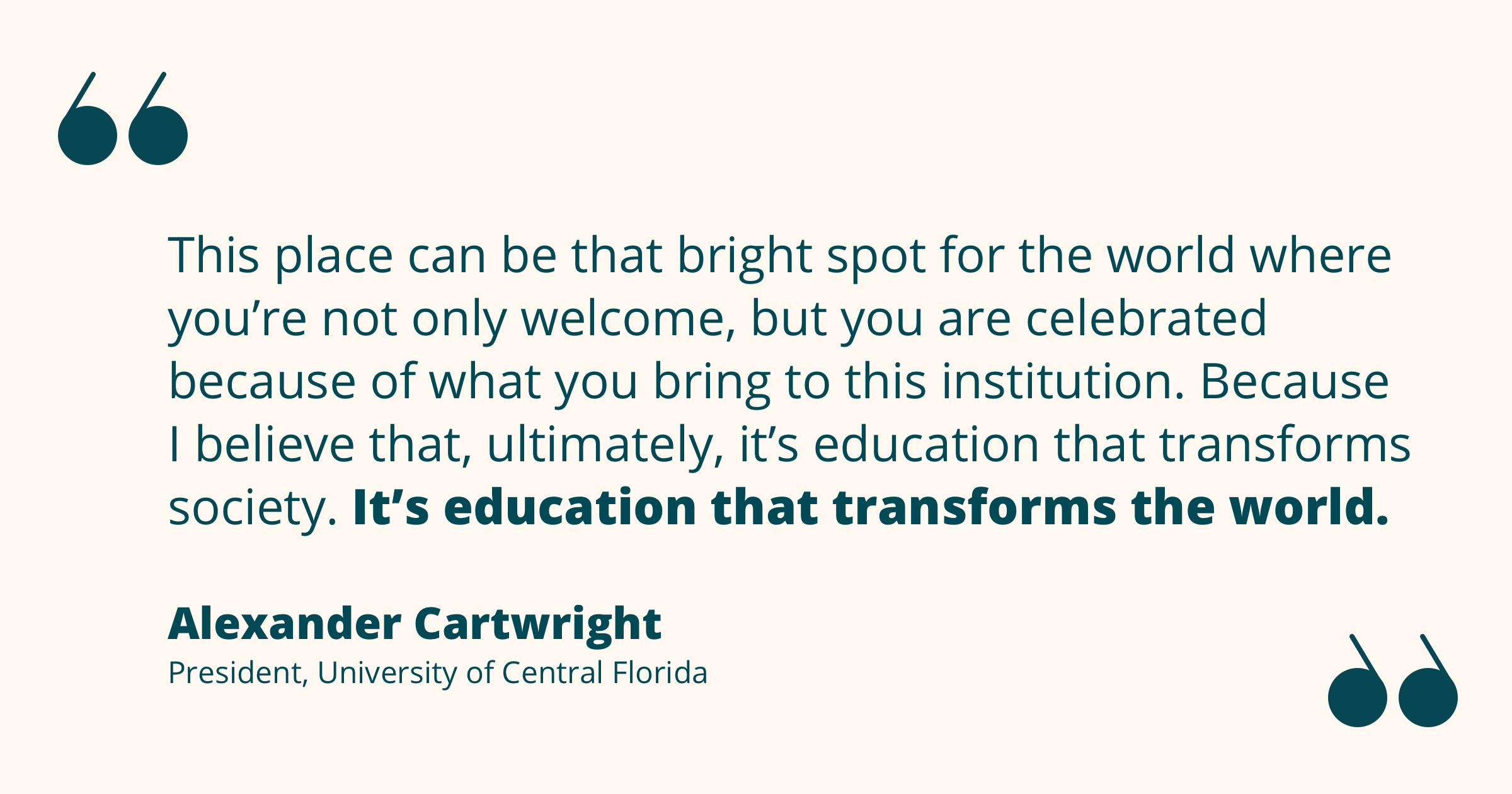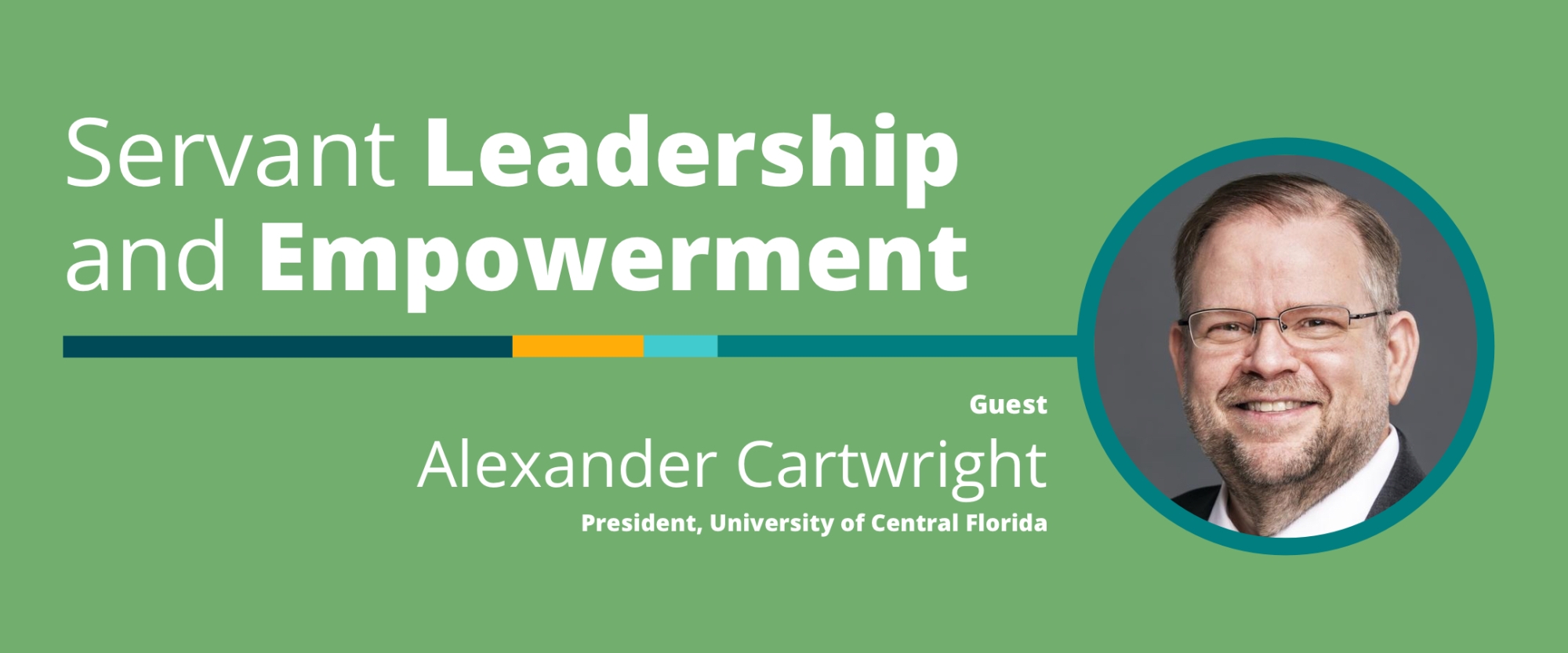Note: This interview, Episode 20 of the Weekly Wisdom Series, originally aired on October 19, 2020 as part of the University Innovation Alliance’s Innovating Together podcast, appearing live on Facebook, Twitter, and LinkedIn.
As Executive Director of the University Innovation Alliance (UIA), I'm excited that we're collaborating with Inside Higher Ed to present the Innovating Together Podcast. One feature of this broadcast is the Weekly Wisdom series, featuring conversations with noted leaders in higher education. My co-host is Paul Fain, Contributing Editor for Inside Higher Ed, and in Episode 20, we spoke with Dr. Alexander Cartwright, President of the University of Central Florida (U.C.F.). As a first-generation college student in his own family, Dr. Cartwright has advocated for student success initiatives and higher graduation rates throughout his leadership career. His wisdom, compassion, and calm left us truly refreshed after this conversation.
Building Relationships at a Distance
Beginning his duties at U.C.F. in the early days of the COVID-19 pandemic, President Cartwright has nothing but praise for his colleagues. "We have a terrific team," he told us. "When I got here, people just stepped up and did everything that needed to be done to continue to prepare us for the fall and certainly also for the summer."
"What I saw was a remarkable institution that had so much potential," he recalled about applying for the position. "And I knew some of the successes that they had had with student initiatives and graduation rates and retention rates, and how that helped underrepresented students, and really closed the gap significantly on retention and graduation rates at this institution. What I saw was a place where I could have an impact, build out the leadership team, and really move this institution forward." Of course, he had no idea that he'd end up assuming leadership during a global health crisis. "I generally am a servant leader," he admitted. "I believe that your job as a leader is to empower people. You need to have people that feel they can make decisions and do things properly, and you’ll support and help them to be the best that they can be.
"And when I came in," President Cartwright went on, "I recognized that this institution had a lot of great people in place already, people that I could rely on. They were able to just take over and do all the things that we needed to do and make a lot of decisions. I’ve been here six months now, and I am literally a talking head. People have not seen me in person – we’re not holding a lot of events on campus. So how do we continue to build community, which is essential? How do you do that electronically? We’ve done a lot of open forums with all sorts of different groups. We have an envisioning exercise that we’re going through right now, meeting with all the different colleges and administrative units. I hope that, over time, we’ll get to a point that we’re able to continue to build those relationships, but in person."
Advice for First-Generation College Students
As a first-generation student himself, President Cartwright vividly understands the concerns and challenges this population is facing during the pandemic. "The best thing that I can think of telling our students is that we’re here for them," he began. "I spent a lot of time this last six months really talking with people about self-care and recognizing that things are difficult, and also recognizing that it’s a challenge for our students, for our faculty, for our staff, and to feel free to reach out and to talk to people and to spend time with each other. We have some amazing students committed to their education, and our job is to ensure that they can have access to that high-quality education, whether it’s trying to find philanthropic dollars or other types of programs."
He reminded us that first-generation students from low-income groups require additional encouragement. "It is going to be difficult over the next year to two years as we continue to see economic impacts of the pandemic," he predicted. "And it’s well beyond just economics. It’s mental, it’s emotional, and we need to provide all the services to help our students to recognize what they might be challenged with and how we can help them through it. I want them to recognize that they have all this potential – and they have a lot of people who are pulling for them, who want them to be successful here at U.C.F."
It may not be entirely coincidental that, in a year of declining enrollment among first-year students, U.C.F.'s numbers are going up. "Our enrollment is up a little over three percent for the fall," President Cartwright said. "We were 69,500. We are closer to 72,000 now. I think that’s built on a number of things. It’s the students who may want to stay local within a large metropolitan area, but in addition, it has to be that our institution was at the forefront of online education, and we had a number of students taking high-quality digital learning courses at this institution. I think that’s carried over where a lot of people continue to choose us, given all that’s going on."
Higher Ed's Transformative Role
President Cartwright was one of the first higher ed leaders to make a direct statement about racial injustice and Black Lives Matter. We asked what motivated him and how he felt able to hit the right tone on that issue with the campus community and beyond.
"We look like the future of America," he stated, "and it’s time for us to be the future of America. It’s time for us to think about how we ensure that everybody has the opportunity to be the best that they can be. I quote The Inner Game of Tennis, where it talks about how your performance is equal to your potential, minus the interferences. And we have so many people here that have incredible potential, but there are so many interferences that stop them from reaching that potential. And people don’t understand how hard it is when you have to worry about walking down the street just because of how you look. That takes an incredible toll, and it’s unfair. It is something we need to address, and it’s something that as a community we want to be committed to.
"This place, U.C.F., can be that bright spot for the world where you’re not only welcome, but you are celebrated because of what you bring to this institution. Because I believe that, ultimately, it’s education that transforms society. It’s education that transforms the world. For many of our students, I think they’re very similar to the way I was. Never in my wildest dreams did I think that I could ever be a president of an institution like this. I want them to have that experience. I want them to have that opportunity."

Servant Leadership
With the frequent, unpredictable changes of a pandemic-wracked society, a large institution like U.C.F. needs to be extremely nimble. President Cartwright described his strategy by returning to the themes of servant leadership and empowerment.
"A fundamental principle is servant leadership is that you have to be in contact with as many people as possible, and you have to get feedback," he explained. "You have to have enough people around you to empower them to have those conversations and make decisions that keep moving the institution forward. And you, as a leader, focus on that long-term vision of 'here's where we want to go.' How do we continue to have a strategic advantage moving forward in digital education? How many people do we have in our offices? Who's going to be working from home into the future? How do we socially distance in our buildings? You want to have sufficient input from the faculty, from staff, and you want to talk to our students and everybody. One person can't do that. If I do, then it slows everything down. We have to be more responsive, but we also need to be completely integrated with our community and having them help us to make the right decisions for the institution moving forward. And that's a tricky balance."
We remarked on President Cartwright's calm demeanor, which he attributed to his early life in the Bahamas. "One of the things I find is, if I’m stressed, that’s when I can’t really think," he admitted. "You need to be able to process information. And so the more you can stay in a place where you don't have your mind made up one way or the other, the better it is to listen to all of the different viewpoints. And people may not always agree with your decision, but they’ll respect the fact that you’ve included them. So when you’re able to stay calm, people are more likely to open up to you also."
Technology and Interpersonal Relationships
The pandemic has forged many changes, some of which President Cartwright feels have been beneficial to U.C.F. and higher ed in general. He started with Zoom meetings. "There’s lots of opportunities for us to do all of those meetings without everybody having to try to move to another location and find a parking spot," he said. "We always felt like we had to travel everywhere for everything. I think we’re starting to learn that maybe we don't need to. And how many employees now work from home and do remarkable jobs for their institutions? They don't have to be right next door. I still have not met my administrative assistant in person.
"Moving into the future is going to be more about the technology," he went on. "At the same time, it is so much more about how much we value each other and those interpersonal relationships. I’ve started to learn how much our students want to be on this campus. The classes, at some level, benefit them because it brings them together. But they also just want other activities that complement what they’re learning in the classroom. And all of that goes, of course, towards students’ success. The more we can do of those things, the better it is for all of us."
Links Mentioned in This Episode
• University of Central Florida
• A year of declining enrollment among first-year students (report from the National Student Clearinghouse Research Center)
• The Inner Game of Tennis by Timothy Gallwey
Bios of Guest and Co-Hosts

Guest: Alexander Cartwright, President, University of Central Florida
Dr. Alexander N. Cartwright became U.C.F.’s sixth president on March 20, 2020. Prior to joining U.C.F., Dr. Cartwright served as the chancellor of the University of Missouri (M.U.) with an appointment as a professor in the Electrical Engineering and Computer Science Department at M.U.'s College of Engineering. He led that institution through strategic enrollment and research growth, as well as the successful completion of a $1.3 billion fundraising campaign. He continuously advocated for student success initiatives, a more equitable and diverse environment, programs designed to improve retention and graduation rates as well as post‐graduation outcomes, and increased efforts to improve engagement with Missourians and beyond. Dr. Cartwright came to M.U. from the State University of New York (S.U.N.Y.) where he served as provost and executive vice chancellor from September 2014 to July 2017, overseeing a portfolio that included academic policy and enrollment management. An internationally recognized researcher and scholar in the area of optical sensors, he is a fellow of the American Association for the Advancement of Science, S.P.I.E., and the National Academy of Inventors. Dr. Cartwright is a prior winner of both the National Science Foundation CAREER Award and the Office of Naval Research Young Investigator Award. In addition, he earned the 2002 S.U.N.Y. Chancellor’s award for excellence in teaching. A native of the Bahamas and a first‐generation college student whose journey to higher education was not traditional, Dr. Cartwright holds a doctorate in electrical and computer engineering from the University of Iowa. He and his wife Melinda have two children, Alyssa and Andrew.

Co-Host: Bridget Burns, Executive Director, University Innovation Alliance
Dr. Bridget Burns is the founding Executive Director of the University Innovation Alliance (UIA). For the past decade, she has advised university presidents, system chancellors, and state and federal policy leaders on strategies to expand access to higher education, address costs, and promote completion for students of all backgrounds. The UIA was developed during Bridget’s tenure as an American Council on Education (ACE) Fellowship at Arizona State University. She held multiple roles within the Oregon University System, including serving as Chief of Staff and Senior Policy Advisor, where she won the national award for innovation in higher education government relations. She was a National Associate for the National Center for Public Policy and Higher Education, and has served on several statewide governing boards including ones governing higher education institutions, financial aid policy, and policy areas impacting children and families.

Co-Host: Paul Fain, Contributing Editor, Inside Higher Ed
Paul Fain joined Inside Higher Ed in September 2011 after six years covering leadership and finance for The Chronicle of Higher Education. He has also worked in higher ed P.R., with Widmeyer Communications, but couldn't stay away from reporting. A former staff writer for C-VILLE Weekly in Charlottesville, Virginia, he has written for The New York Times, Washington City Paper, and Mother Jones. His journalism awards include one for beat reporting from the Education Writers Association and the Dick Schaap Excellence in Sports Journalism Award. Paul got hooked on journalism while working at The Review, the student newspaper at the University of Delaware, where he earned a degree in political science in 1996. A native of Dayton, Ohio, and a long-suffering fan of the Cincinnati Bengals, he plays guitar in a band with more possible names than polished songs.
About Weekly Wisdom
Weekly Wisdom is an event series that happens live on Facebook, Twitter, and LinkedIn. It also becomes a podcast episode. Every week, we join forces with Inside Higher Ed and talk with a sitting college president or chancellor about how they're specifically navigating the challenges of this moment. These conversations will be filled with practicable things you can do right now by unpacking how and why college leaders are making decisions within higher education. Hopefully, these episodes will also leave you with a sense of optimism and a bit of inspiration.
Rate, Review & Subscribe
Learn why hundreds of people have rated this new podcast 5 stars! Please join others and rate and review this podcast. This helps us reach and inform more people -- like you -- to help increase the number of college graduates in the United States.
Click here, scroll to the bottom, tap to rate with five stars, and select “Write a Review.” Then be sure to let us know what you loved most about the episode! Also, if you haven’t done so already, subscribe to the podcast. We’ll be adding a bunch of bonus episodes to the feed and, if you’re not subscribed, there’s a good chance you’ll miss out.

